Choosing a fulfillment partner can make or break your e-commerce business. When juggling inventory, packing orders, and managing shipments, the right fulfillment company can save you many a logistics-related headache down the line, acting as an extension of your brand and ensuring your products reach customers quickly and reliably.
In this article, we evaluate some of the top fulfillment companies that stand out in 2025, comparing their features, pricing, and performance to help you make the best choice for your business.
Table of Contents
E-commerce fulfillment companies at a glance
How to choose a fulfillment company for your e-commerce store
Top 7 order fulfillment brands for e-commerce stores
Future trends in e-commerce fulfillment
Summary
E-commerce fulfillment companies at a glance
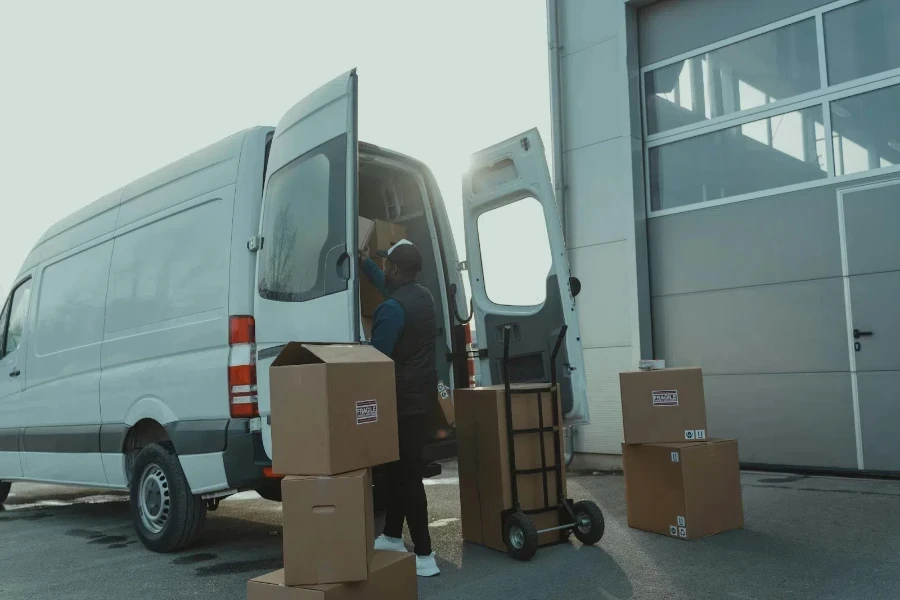
The e-commerce boom has transformed fulfillment companies from simple warehouse operators into vital partners for online brands. These companies do more than just store and ship products – they’re the invisible force keeping orders flowing smoothly from click to doorstep.
The best partners will have warehouses strategically placed across the country, technology that plugs seamlessly into your store, and shipping speeds that meet today’s “I want it now” expectations.
As online shopping evolves and customers shop across more channels than ever, picking the right fulfillment partner goes beyond storage space and shipping rates – it’s about finding a company that can grow and adapt to your business.
How to choose a fulfillment company for your e-commerce store

Here are a few pointers you need on your checklist when comparing the best e-commerce fulfillment brands:
Essential criteria for valuation
Before you pick a fulfillment partner, know your must-haves. If you want to get orders to customers fast, look for warehouses near where most of your shoppers are ordering. Next, if you’re running your store on Shopify or similar platforms, ensure their tech plays nice with yours to avoid order-syncing headaches.
Think about your budget, too. Some companies charge flat rates, while others bill based on what you use. You also don’t want to just focus on today’s needs. Whether you’re shipping food that needs special handling or planning for holiday rushes, pick a partner who can handle your growth.
Key performance indicators (KPIs) to consider
First, there’s order accuracy, which has to be on point. How often they nail the right items in every box matters. Even small mistakes add up fast, turning unhappy customers into expensive returns.
Then there’s processing time and shipping speed – how quickly orders are handled and packages reach doorsteps. Slow fulfillment is a deal-breaker in a world where everyone expects two-day shipping.
Keep a close eye on how they handle inventory, too. Running out of stock is bad, but so is sitting on too much product. Both scenarios eat into your profits. Returns are another big one, especially if you sell clothes or electronics. The best companies make returns painless and quick.
Make sure to review their support team as well. You need people who pick up the phone and solve problems when things go wrong. These metrics tell you if a company can deliver the experience your online customers expect.
Top 7 order fulfillment brands for e-commerce stores
1. ShipBob
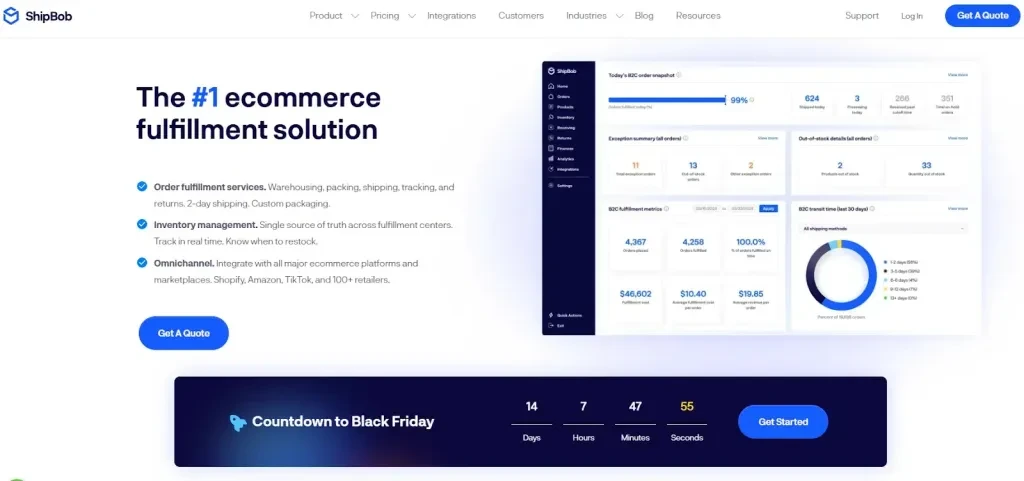
Since launching in 2014, ShipBob has become a go-to choice for growing online brands. Its warehouses are across the US, Europe, and Australia, making it easy to reach customers in these areas. ShipBob’s tech integrates into your Shopify or WooCommerce store, and you can track every package in real -time.
While they’re not the cheapest option, their pricing is straightforward for the basics. They’re perfect for smaller brands looking to scale up, though things can get slower during the holiday rush. Just watch out for those extra fees on premium features.
2. Fulfillment by Amazon (FBA)
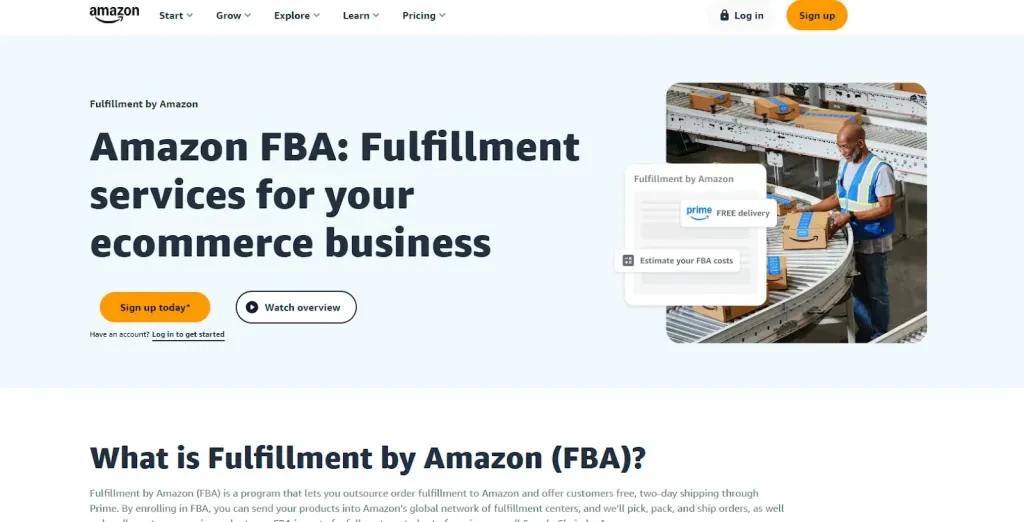
Amazon’s FBA has acted as the powerhouse behind countless online sellers, with warehouses almost everywhere in the world. The big draw is that you get to slap the Prime badge on your products and tap into Amazon’s massive customer base.
Their shipping network is amazingly fast, and everything syncs with your Amazon store. Sure, you’ll pay for the privilege – storage fees and extras can add up quickly, and you can’t customize packaging, but if you’re serious about selling on Amazon or want their delivery speeds for your other channels, FBA’s hard to beat.
3. ShipMonk
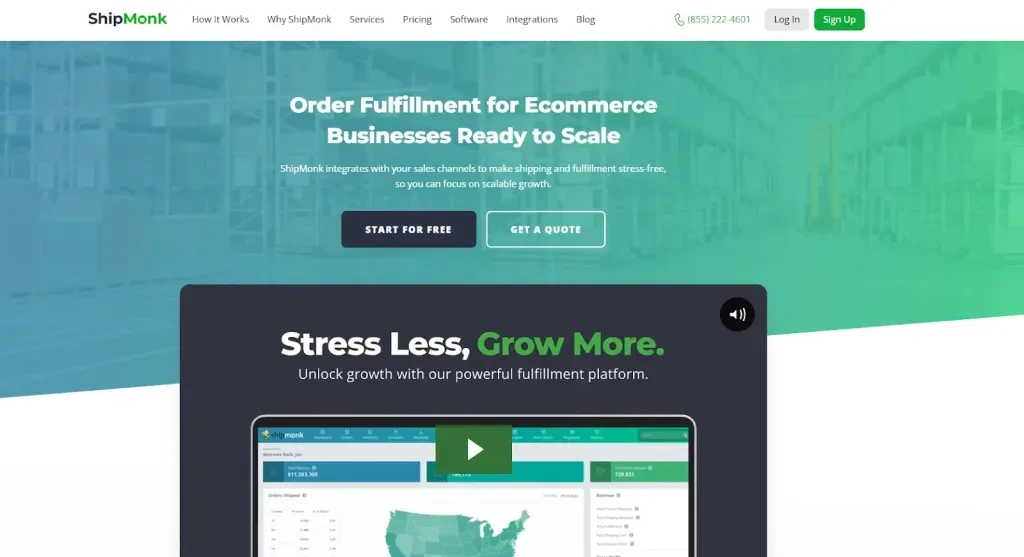
ShipMonk has been in the e-commerce game since 2014, building formidable business operations across North America and Europe.
Its tech is pretty slick, making life easier for growing e-commerce brands. All you need to do is connect it to your store, and you’ll see exactly where your inventory is and how it’s moving. While they’re not a budget option, you know what you get with their pricing, with no surprises lurking in the fine print.
Small or mid-sized e-commerce brands looking to improve their shipping methods may have the most to gain. Just be ready to spend a bit more than the bare-bones alternatives.
4. Red Stag Fulfillment
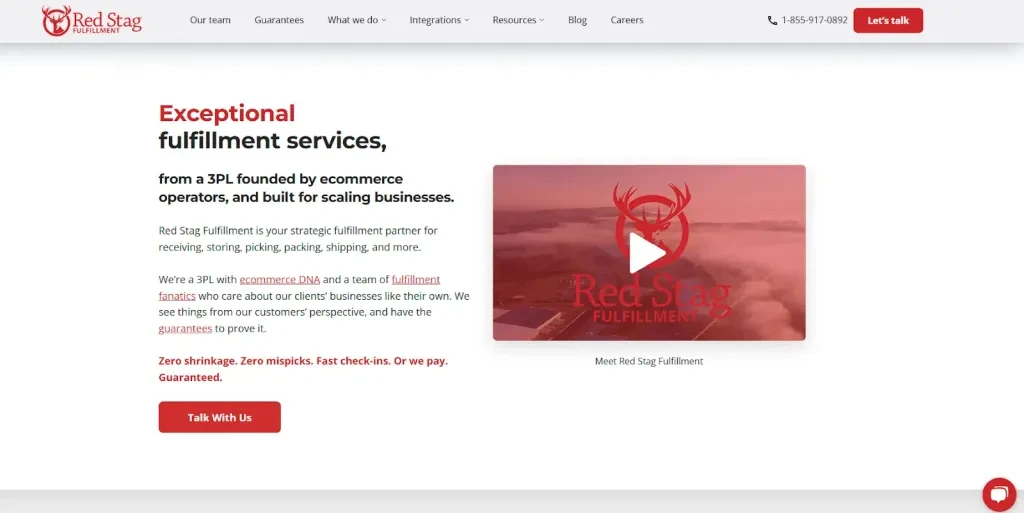
Red Stag Fulfillment pairs each client with a dedicated account manager, ensuring personalized attention that many competitors lack. Their rapid processing and custom packaging solutions help keep returns low, while transparent pricing eliminates surprises on monthly statements.
Perhaps most notably, their zero shrinkage guarantee means you’ll never lose inventory, a rare promise in the fulfillment industry.
While some clients mention their software interface could be more streamlined, Red Stag’s focus on high-priority fulfillment and specialized handling makes them particularly valuable for businesses shipping fragile or high-value items.
5. WhiteBox
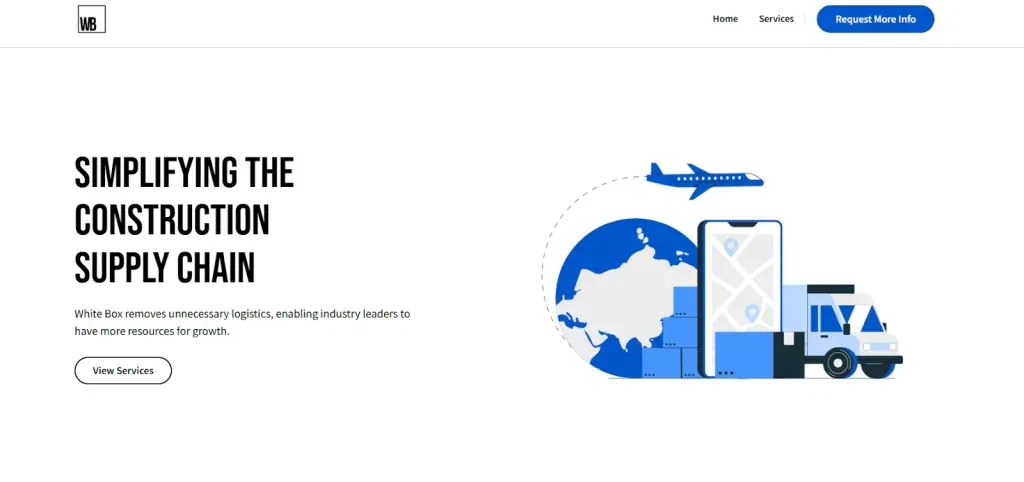
WhiteBox handles everything from storage to shipping, which is perfect if you’re tired of managing construction logistics in house. They mainly work with growing construction e-commerce brands, and their pricing is tied to your sales instead of flat fees, though you’ll part with a USD 3,000 setup cost to get started.
What’s impressive is how they’ve built everything into one platform, making international expansion pretty seamless. While the percentage-based pricing might not work for everyone’s margins, it’s worth considering if you’re looking to scale without the hassle of managing multiple vendors.
6. ShipHero
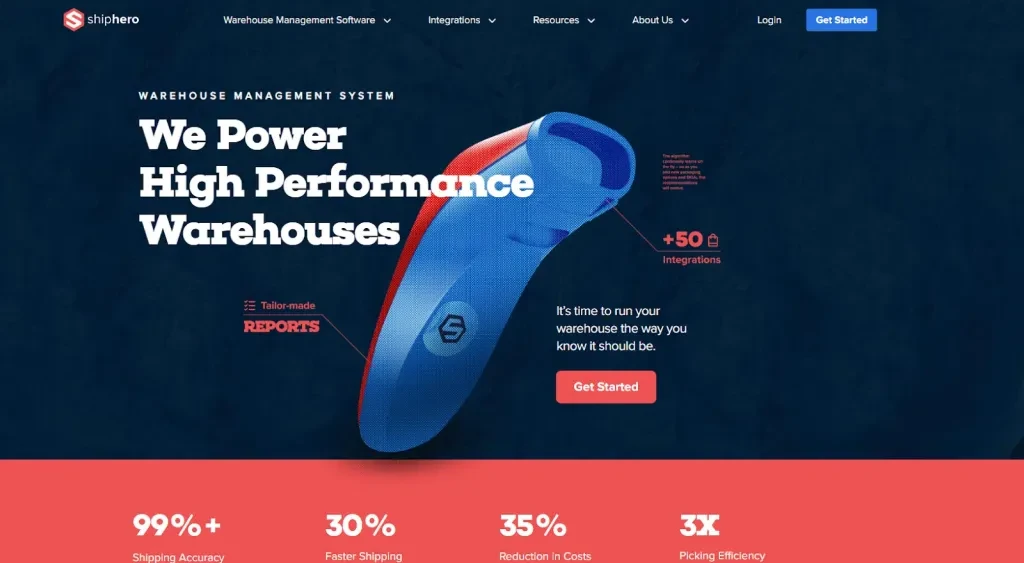
ShipHero combines warehouse management and fulfillment in a single platform, pitting it against the major e-commerce sites. Their real-time inventory tracking and shipping rate comparison tools help keep costs in check, while their hybrid approach lets businesses run their warehouses alongside third-party fulfillment.
Starting at USD 499 a month, they offer many advanced features, including seamless store integrations and returns processing. However, customer support can be spotty during peak seasons. Overall, ShipHero is an ideal fit for operations needing robust warehouse tools.
7. ShipNetwork
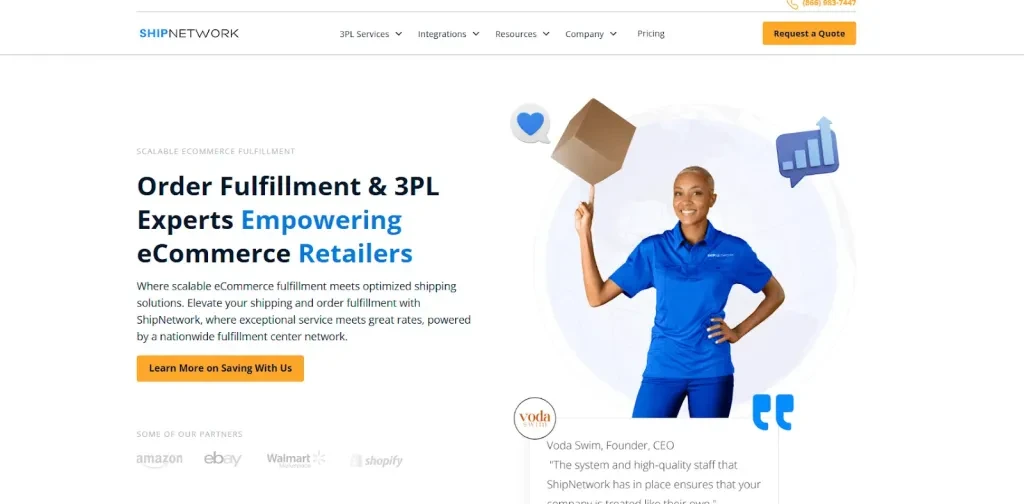
ShipNetwork (formerly Rakuten Super Logistics) leverages its nationwide fulfillment centers to deliver packages in as little as two days. Their tech stack handles everything from real-time tracking to detailed analytics, with seamless connections to Shopify and WooCommerce.
Since their 2022 rebrand, they’ve beefed up their international shipping capabilities and added specialized services like kitting and custom packaging. They’re best for growing e-commerce brands that need a fulfillment partner with technical sophistication and physical infrastructure to match their ambitions.
Future trends in e-commerce fulfillment

As consumer expectations keep climbing, e-commerce fulfillment is shifting toward smarter, faster operations. Robots are now a common sight in warehouses, handling picking and packing with impressive speed while helping reduce errors and labor costs.
We’re also seeing more emphasis on green practices, from eco-friendly packaging to carbon-neutral shipping options. Behind the scenes, AI is improving at predicting what customers want and where inventory should be stored.
Many businesses mix in-house operations with outside help, giving them more flexibility to scale up or down as needed.
Summary
When picking a fulfillment partner, most e-commerce brands look at heavy hitters like ShipBob, Amazon’s FBA, and ShipMonk for their tech capabilities and wide reach. What matters is finding a provider that is upfront about costs, tracks orders accurately, and offers solid support when needed.
The industry is moving fast, with robots and AI making operations smoother, while sustainable shipping options are becoming more important to customers. The best companies are those that combine a range of fulfillment methods with a focus on faster delivery times that don’t break the bank.




